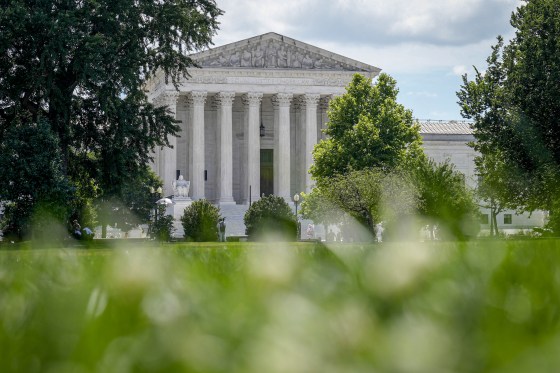WASHINGTON — The Supreme Court on Monday grappled with a complex challenge to a panel set up as part of the Affordable Care Act to recommend preventive care services that insurers have to provide at no cost to patients.
The case on which the court heard oral arguments arose from a challenge brought by Christian employers Braidwood Management and Kelley Orthodontics, in addition to several individuals, who objected on religious grounds to the Preventive Services Task Force’s approving no-cost coverage for the HIV prevention medication known as PrEP.
The plaintiffs believe their religious rights are violated “by making them complicit in facilitating homosexual behavior, drug use, and sexual activity outside of marriage between one man and one woman,” according to court papers.
The case at the Supreme Court does not hinge on the religious questions raised under the Constitution’s First Amendment.
At issue is whether the Preventive Services Task Force — which recommends a wide array of preventive services related to such issues as cancer, diabetes and heart disease — is unconstitutionally structured.
The challenges say it violates the Constitution’s appointments clause because its members are not nominated by the president and confirmed by the Senate. Furthermore, the task force members are intended to be independent and not under the control of the health and human services secretary, the challengers say.
During the oral arguments, several justices seemed unpersuaded that the members have to be appointed by the president.
But even a ruling rejecting that argument does not necessarily mean the case is over, as other questions remain, including whether previous members were properly appointed and whether their previous decisions, including about the AIDS-related medication, should be thrown out.
A broad ruling in favor of Braidwood would have a significant impact, as the task force’s previous decisions would be cast into doubt and insurers would no longer be required to cover the affected preventive services.
The panel, which is composed of outside experts, was set up as an independent body appointed by the federal official who heads the Agency for Healthcare Research and Quality. It has 16 members.
The issue of whether the statute's requirement that the panel be independent and whether that creates constitutional issues by limiting the HHS secretary's power to supervise it was heavily debated during the argument.
Liberal Justice Elena Kagan told Jonathan Michell, the lawyer representing the challengers, that his argument "really does rise or fall on how we read that independence language."
But, she added, it could be interpreted to simply mean that the panel members are required to give their unvarnished views on medical issues and not that the HHS secretary is required to follow their advice.
"So why shouldn't I read the statute that way?" she asked.
Fellow liberal Justice Sonia Sotomayor and conservative Justice Amy Coney Barrett seemed receptive to that view, comparing the advice the panel members give to the feedback justices get from their law clerks.
Barrett said she wants her clerks to give her an independent view “free of political influence or free of outside influence,” but that doesn’t mean they should not consider her own approach to such issues.
Similarly, Sotomayor said she expects her clerks to give her independent judgments.
"And they'll tell you, there's some times — a lot of times — I don't accept it, and I certainly have the power to fire them," she said.
Conservative Justice Brett Kavanaugh also cast doubt on some of Mitchell's arguments, saying his theory "depends on us treating the task force as this massively important agency that operates with unreviewable authority" without any oversight from the HHS secretary.
"I just don't see indications of that," he added.
On the other hand, Kavanaugh, in a different exchange, said that in defending the task force, the government had come up with "an odd definition of 'independent.'"
That was a view shared by conservative Justice Samuel Alito.
"If Congress really wanted these task force members to do the bidding of the secretary, isn't that an incredibly odd way to go about conferring that authority?" he said.
The dispute is the latest in a long line of cases concerning the 2010 health care law — President Barack Obama’s signature legislative achievement — which Republicans have relentlessly attacked in court.
On this occasion, the Trump administration is defending the provision after having taken over the case from the Biden administration.
The government argued that the task force members are lawfully appointed because they are under the supervision of the HHS secretary, a position currently held by Robert F. Kennedy Jr., which addresses any concerns that it is not accountable to the executive branch.
Even if the court were to find that the panel is unconstitutionally appointed, it could resolve the issue by finding that it is not independent and that its actions must be approved by the HHS secretary. The court took a similar approach in a 2021 case about in-house judges at the U.S. Patent and Trademark Office.
After the lawsuit was filed in 2020, a federal judge in Texas issued a ruling that said the structure of the task force was unconstitutional and that all of its decisions should be considered invalid nationwide.
The New Orleans-based 5th U.S. Circuit Court of Appeals narrowed that ruling somewhat. The Biden administration then took the case to the Supreme Court.
The Supreme Court has a 6-3 conservative majority that has whittled away at the power of independent federal agencies. A case about President Donald Trump's attempt to fire members of two such agencies is pending.
Kagan seemed to refer to the majority's approach on such issues in noting that Mitchell seems to want the justices to declare the task force to be an independent agency.
"I mean, we don't go around just creating independent agencies. More often, we destroy independent agencies," she said.

